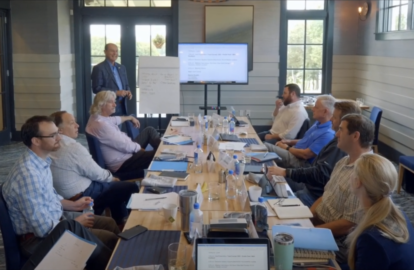The term “it’s just business” doesn’t apply to entrepreneurs. The company that you build from idea up, that you guide through challenges and trials, oftentimes becomes an extension of you. It provides income and, perhaps employment, sure; but more than that, it’s a wellspring of purpose, identity, and community.
Exiting can seem as unfathomable as severing a limb, especially if you are not well prepared – logistically, financially or mentally. Determining your post-exit plans now will ensure you do not leave before you’re ready – and that you tackle life after with confidence and enthusiasm.
The Cure for Exitor’s Remorse
We are all familiar with “buyer’s remorse.” Exitor’s remorse is a similar concept: it’s the frustration and pain of regretting your exit. And it can be intense. After the fact, there is nothing you can do. That limb has been severed.
Before the fact, though, there is much that you can do to avoid the risk – and the heartache – of regret. To prepare for life after exit, it is critical to examine four key areas. Let’s take a close look at each.
Financial Freedom
When you think of life after exit, what comes to mind? Travel? Starting another business? Becoming a consultant or coach? Leisure? Volunteering? The big question is: do you have the ability to fund these plans and dreams? Financial freedom means that work is a choice, not a necessity. To determine if you are “free,” ask yourself the following questions:
- How have you invested your assets? Are you confident that your strategy will allow you to meet your post-exit financial needs (e.g. living expenses, travel, health needs, etc.)?
- Investing to ensure you have sufficient income after exit comes with risks. Are you comfortable with level of risk you’re taking?
- What steps have you taken to account for inflation? What if your purchasing power is reduced?
- Have you reduced potential investment risk by diversifying your assets?
- Are you confident that your investment and financial advisers and managers are providing the best guidance?
- Do you have the equivalent of six months’ overhead in cash/savings for emergencies?
- Have you lined up post-exit medical insurance?
- Have you updated your estate planning to reflect this major life change?
- Do you have a plan in place for assisted living, if that becomes a necessity in the future?
- Have you tackled post-exit income tax planning?
- What if you need to change or revise your personal financial plans? Do you have a strategy in place to monitor and update them?
These are complex questions – and the answers have a significant impact on your post-exit life. If you do not have this solid foundation built yet, you may not be ready to exit. Enlist the aid of an exit strategist, or at the very least, qualified financial advisers.
An Ideal Calendar
Without the business to guide your days, you may feel rudderless. Ask these questions pre-exit to help build a more fulfilling post-exit life:
- What are you going to do with your time after you exit your business?
- How much time are you going to take off immediately after exit? Will this be enough? Too much?
- Are the activities in which you plan on engaging likely to be satisfying and stimulating in the future? In other words, how soon will you burn out on golf (or insert favorite activity here)?
- Have you taken any time away from the business to explore different interests, activities, and hobbies? Is it enough to validate your post-exit plans?
- Are your talents and skills going to be utilized after exit?
- Do you want to give back to your community after you leave your business? How will you do that?
- Do you have a plan to balance recreational and non-recreational activities? What is it?
- Do you want to pursue other business ventures? If so, examine why you were happy and successful in your current business so you can apply those lessons to future endeavors.
According to a recent Retirement Priorities Quiz developed by financial expert, author, and “retirement activist” Robert Laura, less than 25 percent of respondents have a plan detailing expectations for an ideal day and week in retirement.
Laura writes that soon-to-be-retirees “often start off with a bang” when asked to describe an ideal day and week of retirement, “but quickly run out of ideas and things to do halfway through the day and week.” Plans are “vague and superficial,” and this can make the transition to post-exit life a rough one.
Again, the cure is preparation. Think about the answers to these questions. Write down your plans. Put as much effort into planning the personal side of post-exit life as you do for the financial side.
Business Legacy
When you exit, what legacy do you want to leave behind?
- Do you have any serious regrets concerning the business?
- Do you feel as though the business is a painting that you have “finished”? Or is it still undone?
- How confident are you in the business’s ability to go on without you?
- As you navigate the exit process, will your employees be treated respectfully and fairly?
- Will your employees be well positioned for ongoing success?
- Have you recognized and thanked key employees?
- Are you confident that your top customers will be taken care of and that important external relationships will be fostered after you leave?
- Will the business be in good hands?
- Will the new leaders, foster a positive and productive culture?
- Do you think the values on which you built the business will be upheld as you exit and after?
- Will the business’s reputation remain positive, and will it continue to contribute meaningfully to the community?
- Do you have any concerns about letting go of the business?
- Are you exiting at the top of your game?
As you exit, you need to ask, “What’s next?” in terms of your finances and personal plans. Don’t forget to ask the same question about the business that you’re leaving behind. You’ve built a business; now it’s time to build the legacy.
Family and Personal Peace of Mind
Your family and friends are an integral part of your exit team. Take the time to consider the following:
- Have you shared your plans, hopes, and dreams with key family members and friends?
- Do they – or will they – support these plans?
- How will your exit affect your family and relationships? Will changes in your daily routine cause disruptions?
- Will your exit interfere with the needs or aspirations of your children or other family members?
- Is your family prepared for changes to benefits and perks that will accompany your exit (e.g. travel, vehicles, etc.)?
- Will relationships with people in your industry, employees, customers, and partners suffer if you exit?
- Is the timing right for you to exit?
- Are you exiting on your terms?
- Are you excited for post-exit life?
The last three are, perhaps, some of the most difficult to answer. While you must balance the needs of your family and close friends, you also need to ask, “Is this right for me, and is it right for me now?
Ready… Or Not?
Reflect on these four categories, and on the answers to each question within. Which areas give you most cause for concern? Where do you feel you are inadequately prepared? On the other hand, in which of these areas are you most prepared and comfortable?
You’ve had a lot of questions thrown at you today; but it is important to address and answer them now rather than waiting until exit. Not only will it help guide your planning; it will help ensure you can “dance in the end zone,” to borrow NAVIX Consultants CEO Patrick Ungashick’s analogy.
NAVIX’s exit specialists can help you choreograph that dance for optimal results. Start with assessments, similar to the questions you faced here. They are tremendously useful in gauging your financial, personal, and strategic readiness, as well as determining your post-exit plans. Your NAVIX consultant can then help you execute the strategies and tactics necessary for a successful outcome.
When it comes to your company, it’s never “just business.” You’ve worked hard to support your company; when you plan strategically and holistically, it can support you and the next chapter of your life.


